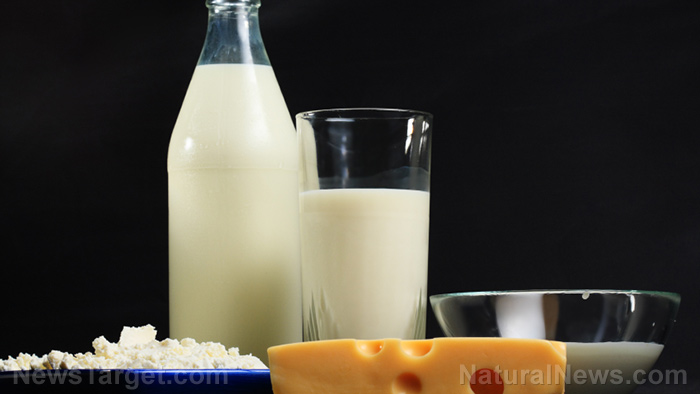 Parler
Parler Gab
Gab
- A new study in Clinical Nutrition reveals dairy consumption stabilizes blood sugar better than a strict vegan diet, challenging plant-based superiority claims.
- Researchers found dairy eaters had lower glucose levels and higher beneficial compounds like acetyl-L-carnitine, while vegans experienced more blood sugar spikes.
- The trial involved 30 adults, with diets matched for nutrients; only dairy intake differed, proving its unique metabolic benefits beyond macronutrients.
- Dairy’s bioactive compounds may reduce oxidative stress and improve glucose processing, contrasting with vegan diets linked to higher phenylalanine, which impairs sugar metabolism.
- The study emphasizes dietary diversity over restrictive trends, advocating for natural, whole-food solutions instead of pharmaceutical or dogmatic dietary approaches.
The blood sugar advantage of dairy
Lead researcher Professor Vimal Karani noted, "People eating the vegan diet had more of a substance called phenylalanine after meals. When there's too much of this substance, it might make it harder for the body to use sugar properly. On the other hand, people eating dairy had different helpful substances in their blood, which may have helped keep their blood sugar more stable throughout the day." Dairy consumers benefited from acetyl-L-carnitine, which appears to mitigate cellular damage caused by glucose fluctuations. This may explain why epidemiological studies consistently show lower rates of type 2 diabetes among dairy consumers. The implications are critical for public health, particularly in places like the U.S., where diabetes and prediabetes affect much of the population. The study’s controlled design eliminates confounding variables, suggesting that dairy’s bioactive compounds and not just its macronutrient play a unique role in metabolic regulation. This research underscores a recurring theme in holistic health: whole, natural foods often outperform artificial or restrictive dietary trends. While the vegan movement has gained traction, this study adds to mounting evidence that eliminating entire food groups like dairy may inadvertently harm metabolic resilience. Unlike diabetes drugs, which mask symptoms while risking side effects, dietary interventions like dairy consumption address root causes without synthetic chemicals. The findings also expose the dangers of dietary dogmatism. As veganism becomes increasingly politicized, this study reminds us that nutritional needs are individualized—not dictated by trends.The freedom to choose real food
The study’s message is clear: dietary diversity matters. While vegan diets can be healthy, they are not inherently superior—and for blood sugar control, dairy may be a critical ally. As governments and corporations push one-size-fits-all dietary guidelines, this research defends the freedom to choose evidence-based, natural solutions over processed alternatives or Big Pharma’s quick fixes. For those seeking metabolic health, the answer isn’t in a pill or a propaganda-driven diet; it’s in the time-tested wisdom of real food. Sources for this article include: TheEpochTimes.com ClinicalNutritionJournal.com HortiDaily.comFrom lab solvent to lifesaver: DMSO’s potential for brain, heart, pain and cancer treatment
By Olivia Cook // Share
Bananas: A versatile superfood with global appeal
By Laura Harris // Share
Four top health benefits of pumpkin
By News Editors // Share
Vitamin D3 supplements slow aging by protecting telomeres, study reveals
By Cassie B. // Share
Ancient human ancestors found in submerged Indonesian homeland
By Willow Tohi // Share
Study: Mouth bacteria possible culprit of chronic pain
By Ava Grace // Share
Governments continue to obscure COVID-19 vaccine data amid rising concerns over excess deaths
By patricklewis // Share
Tech giant Microsoft backs EXTINCTION with its support of carbon capture programs
By ramontomeydw // Share
Germany to resume arms exports to Israel despite repeated ceasefire violations
By isabelle // Share










